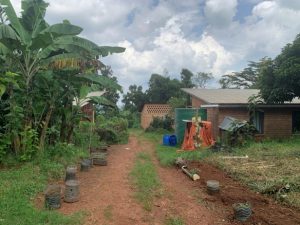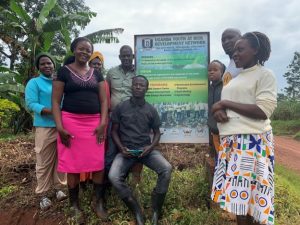Aishah Ahmad visited Uganda in June and July 2023 with the support of the Alliance for Food Sovereignty in Africa (AFSA). During this time she conducted field research on the agroecology landscape in Uganda. Aishah collected primary qualitative data using interviews and field observations, working with smallholder farmers located across the four districts of; Mityana, Mubende, Buikwe, and Wakiso. In total she visited upwards of 50 farms in Uganda and assessed their transition to agroecology. The data collected will be used to boost the advocacy aspect for AFSA’s Healthy Soils Healthy Food (HSHF) programme and her master’s dissertation on “Building Resilience of Small-scale Farmers Transitioning to Agroecology in Uganda. Aishah began her journey at the AFSA office in Kampala and later proceeded to spend the majority of her trip residing at the Rural Community in Development (RUCID), a HSHF centre in Mityana district, Uganda. During her research she reveals both the positive impacts agroecology has had for small scale farmers as well as assessing existing challenges and ways to move forward.

The RUCID Centre in Mityana district, Uganda.
During her research she learned common agroecology practices alongside Ugandan farmers that included; crop diversification, intercropping, contouring, and the preservation of indigenous seeds and making biofertilizers and bio-stimulants. These practices not only enhance food variety and nutritional value but also build resilience against climate change impacts. For example, the indigenous seeds are adapted to local conditions and offer higher resilience to pests and diseases, and require less inputs than commercial varieties. This not only reduces costs for farmers but also safeguards agro-ecosystem biodiversity.
Aisha learned that trainers supported by RUCID are transforming their farming communities. For example, former primary school teacher Mr Herbert, inspired by the training in agroecology at RUCID, has seamlessly integrated agroecological practices into his new educational centre. He founded a private primary school situated on a substantial plot that he has dedicated to incorporating education and agroecological farming. Here, he combines traditional agroecological methods like intercropping with innovative urban gardening techniques, maximizing every space to cultivate nutrient rich food for his students. He incorporates the use of indigenous seeds to grow a large variety of nutrient dense vegetables and fruits, particularly a nutrient-rich variety of orange maize that he received from Rwanda that is high in Vitamin A and beta carotene, an essential micronutrient for vision and immunity. Mr. Herbert not only enhances the food’s nutritional value but also teaches vital lessons in sustainability. His school’s curriculum intertwines hands-on gardening with nutrition education, aiming to foster a new generation of environmentally conscious, health-aware farmers. The inclusion of livestock and a focus on dietary diversity further enriches the student experience, making agriculture an engaging and respected profession among the youth.

Herbert Mugisha’s school
The next part of her journey was in the western region of Uganda in Mubende. Mubende is known for its arid land and frequent droughts making the land less fertile for growing. Aishah visited this region to assess agroecological practices and adaptation techniques implemented by farmers. She worked with trainers; Talemwa Chrissy and Besigye Kenneth, among others. Here she learned much about the popular regional farming practices and crops. This included; coffee, a cash crop that is often intercropped with bananas used for household food security. Both crops can be found on nearly every farmer’s land and are the most valuable crops for farmers within this region. She also learned about Initiatives led by trainer Talemwa Chrissy, such as; beekeeping and local stove making which enhance the climate and provide household income.
Beekeeping has many benefits to an agroecological farm such as inviting pollinators and providing an extra source of income from honey, as it is a valuable crop that is easy to sell. Implementing beehives is relatively easy to install and low cost, only requiring a small plywood box to attract the queen bee with a strong sweet scent and then once the queen bee has arrived the other bees follow shortly. Honey is a high-value product that farmers can sell for a good price and in turn the bees will help to pollinate their other crops. The only challenge some farmers like Chrissy reported having is that neighboring farmers who use pesticides and other toxic chemicals deplete the local bee population. For farmers who practice agroecology and understand the importance of pollinators to the ecosystem it can make it difficult for them to have enough pollinators in the area.
Along with Besigye Kenneth she learned the importance of local stoves and had the opportunity to participate in creating one. Local stoves are used in Mubende to help mitigate challenges of drought, as local stoves use limited firewood compared to traditional firewood stoves. The local stoves are made with a mixture known as local “cement” that is a combination of multiple soils, that is then formed into the shape of a typical stove, three pieces of firewood are then placed underneath and the fire can burn for up to a full day. This is in comparison to a firewood stove that requires nine pieces of firewood per cook; the local stove can reduce the amount of firewood used per day by over 75%.
Telumwe Chrissy is also working with local farmers groups to begin indigenous seed banks; he and other farmers have been collecting seeds of indigenous crops. They are starting local seed banks within their communities and encouraging farmers’ groups to exchange seeds with each other. They hope to rely only on indigenous crops and use the seeds to bring back the diversity in their natural environment.
Many farmers in Mubende are heavily focused on cash crops such as coffee and maize which is mainly only intercropped with bananas, while they have some other supplement it is not enough to ensure household food security especially if there are market fluctuations.
Aishah noted some constraints that prevent trainers from performing their duties to the best of their abilities. Trainers in Mubende averagely look after over 50 farmers, with limited finances for transportation and long distances, it is difficult for them to gather regularly, maybe only seeing each farmer once a month, training can be on a time constraint due to this, and the trainers have difficulty being able to see each person’s farm and keep track of progress. This can negatively impact the outcome and consistency that is needed for successful conversion to agroecology.
Drought is a big issue within this area and according to many farmers, one of the main causes of drought is the extensive deforestation from cutting down trees for firewood to cook. The Mubende people are working to improve this with their local stove method and household reforestation efforts, but it is a slow progress.
Upon the end of her time in Mubende, she visited Homeland Organics and Kazo Farmers Association and noted a trend of forming farmer groups and integrating agriculture into agrotourism. She first explored Julius, the owner of Homeland Organics. Julius proudly owns a hub for permaculture, agroforestry, beekeeping, and a large community indigenous seed bank. Julius provides a large space for learning and relaxation for both tourists and farmers alike, emphasizing seed trading and knowledge exchange. Nearby, Aloysius runs Kazo farmers association, a farm focusing on climate-friendly agriculture rooted in traditional knowledge. He employs methods like “charcoal fridges‘ ‘ for preserving crops and seeds and educates on climate change mitigation. His establishment also features an eco-lodge, promoting agricultural education as an engaging and accessible experience for tourists and farmers.
The other half of her journey found Aishah in the central regions of Uganda, where she had the opportunity to explore different landscapes and agricultural practices. In Buikwe, she visited the K-Sam farmers group led by Samuel Kabuye. They specialize in a range of organic fertilizers and pesticides, and have developed their own unique blend through combining different practices; this is what they call the; KF99 biofertilizer. KF99 combines a fermented mixture of 12 local plants that aid in soil health and are pest resistant. Their community outreach through Uganda Youth at Risk Development Network (UYDNET), targets at-risk youth, offering agroecology training for improved livelihoods. Their goal is to reach 50 districts by 2025. K-Sam’s efforts symbolize a growing movement towards sustainable agriculture in Uganda, transforming conventional farming practices into eco-friendly, resilient food systems.

Uganda Youth at Risk Development Network and K-Sam family
Some of the main barriers affecting farmers In Buikwe are the prevalent poverty and food insecurity. This is partly due to extensive sugarcane and pine tree plantations that are owned by large corporations. Due to these large monocropped farms that use intensive farming methods and heavy chemical use, they impose great risks to the neighboring farms, including depleted soils from chemical use. Due to this, many small scale farmers in this region complained that they are unable to grow a variety of crops including once indigenous crops such as mangoes, and species of beans due to the dry soil.
Land access is also an issue with one group of farmers in Buikwe who complained that owning farmland can be quite difficult and most farmers rely on renting the little land that is not owned by the plantation owners. This leads to many farmers being forced to work in the plantations or to grow sugarcane to sell to the sugar processors as that is the only form of financial and food security, but this does not guarantee adequate health and nutrition of farmers.
.
Story by: Aisha Ahmad and Charles L. Tumuhe
































